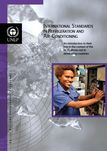Healing the ozone layer through diplomacy
The Montreal Protocol shows what is possible when science, diplomacy, and business cooperate to implement international environmental agreements. When the people became aware of a hole in the ozone layer
The Montreal Protocol shows what is possible when science, diplomacy, and business cooperate to implement international environmental agreements. When the people became aware of a hole in the ozone layer
<p>The Earth's protective ozone layer is well on track to recovery in the next few decades thanks to concerted international action against ozone depleting substances, according to a new assessment by 300 scientists. The Assessment for Decision-Makers, a summary document of the Scientific Assessment of Ozone Depletion 2014, is being published by the UNEP and the WMO, and is the first comprehensive update in four years. The stratospheric ozone layer, a fragile shield of gas, protects the Earth from harmful ultraviolet rays of the sun. Without the Montreal Protocol and associated agreements, atmospheric levels of ozone depleting substances could have increased tenfold by 2050. According to global models, the Protocol will have prevented 2 million cases of skin cancer annually by 2030, averted damage to human eyes and immune systems, and protected wildlife and agriculture, according to UNEP.</p>
The Environmental Protection Agency is proposing to jettison yet another formerly popular compound used in air conditioners, vending machines and aerosol spray cans, citing its impact on global warming.
<p>Chlorofluorocarbons (CFCs) are the primary cause of ozone depletion, and they also contribute to global climate change. With the global phaseout of CFCs and the coming phaseout of hydrochlorofluorocarbons

This guide provides an introduction and simple overview of the issues related to international standards in the refrigeration and airconditioning sector and how they can be useful in the context of the
The European Parliament on Wednesday backed a law to curb the use of "super" greenhouse gases used in fridges and air conditioners, which have a global warming potential thousands of times greater than
WARSAW: Laughing gas is, indeed, no laughing matter. The United Nation Environment Programme (UNEP) on Thursday released an eye-opening report on the sidelines of the ongoing climate talks, warning that
Industrialised countries should phase out HFC says Sunita Narain, Director-General, CSE in this presentation at CSE Annual South Asian Media Briefing Workshop on Climate Change, 2013 held from September 18-19, 2013.
Speakers at a seminar on Monday stressed the need for developing a sense of urgency for stopping the use of ozone depleting substances to avert adverse impact on global climate. Ozone depleting substances
This second edition of "Vital Ozone Graphics" includes details on the latest decisions taken by the Parties to the Montreal Protocol to accelerate the phase out of HCFCs and outlines the implications this
Various events would be organized to mark World Ozone Preservation Day on Monday by the regional office of UP Pollution Control Board. Regional officer Mohd Sikandar said that a symposium would be organised at Saras Hall of Vikas Bhawan on 'preservation of ozone layer'. It would be attended by students, teachers and other prominent persons.